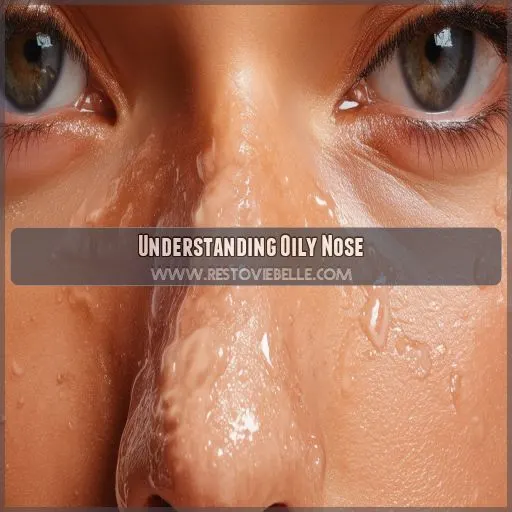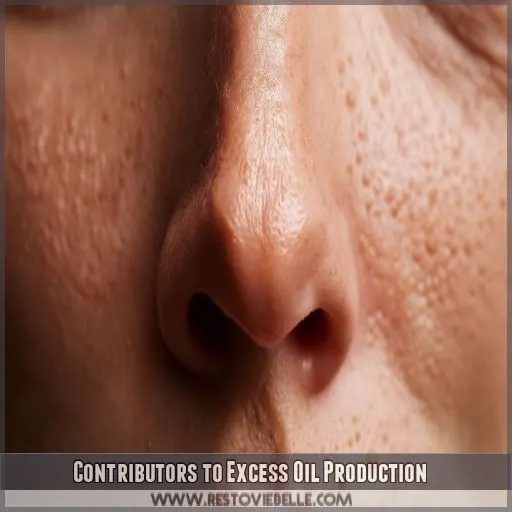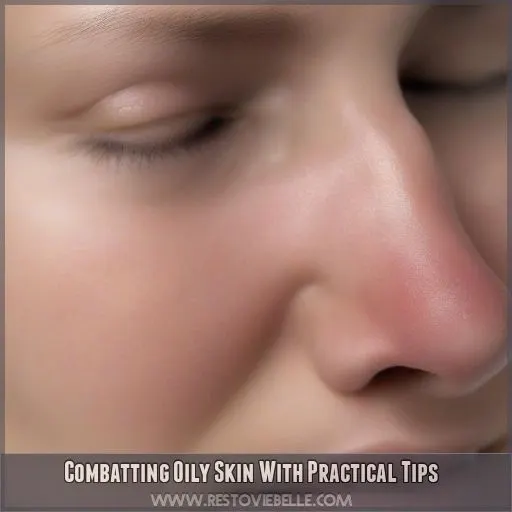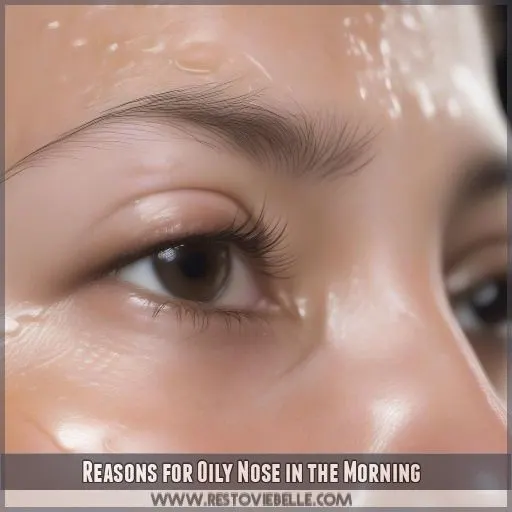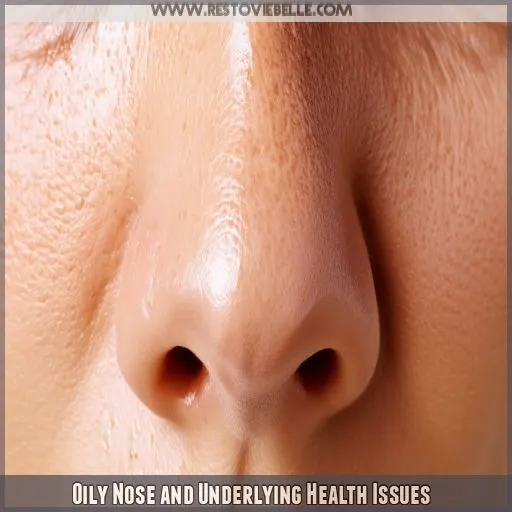This site is supported by our readers. We may earn a commission, at no cost to you, if you purchase through links.
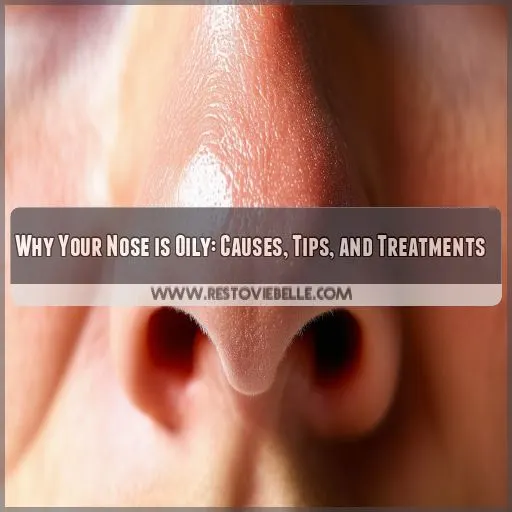 Greasy nose getting you down?
Greasy nose getting you down?
You’re not alone. Many people struggle with an oily nose, a common skin concern.
If you’re wondering why your nose is so shiny and what you can do about it, read on.
We’ll explore the causes of oily skin, from genetics to hormones, and offer practical tips and treatments to help you achieve a more balanced complexion.
Let’s tackle that oily nose together!
Table Of Contents
- Key Takeaways
- Why is Your Nose So Oily?
- Understanding Oily Nose
- Contributors to Excess Oil Production
- Combatting Oily Skin With Practical Tips
- Daily Habits to Manage Oily Nose
- Long-Term Strategies for Balanced Skin
- Reasons for Oily Nose in the Morning
- Oily Nose and Underlying Health Issues
- Frequently Asked Questions (FAQs)
- Why is my nose oily?
- What causes excess oil on the face?
- Why does the skin on the nose produce more oil?
- Is an oily nose a sign of an underlying health issue?
- What causes an oily nose?
- How can I manage an oily nose?
- Are there professional treatments?
- What long-term strategies can I use?
- Are there health issues linked to an oily nose?
- Conclusion
Key Takeaways
- You’re not alone in your battle against a greasy nose. It’s a common skin concern, and understanding the causes is the first step to tackling it.
- Your nose is one of the oiliest parts of your face due to a higher concentration of sebaceous glands, which produce sebum, giving your skin a natural shine.
- Genetics, hormones, and stress are key players in the story of oily skin, and they can influence each other to make your nose a shiny spotlight.
- Managing an oily nose is about finding balance. A consistent skincare routine, lifestyle changes, and professional treatments can help you achieve a matte look without drying out your skin.
Why is Your Nose So Oily?
Your nose is often oily because your skin produces excess sebum, a natural oil that can be influenced by a variety of factors, including genetics, hormones, stress, and environmental conditions.
To find out more about what could be causing your oily nose, and for tips on how to manage it, keep exploring.
Understanding Oily Nose
Your nose is one of the oiliest parts of your face, and that’s because it has a higher concentration of sebaceous glands. These glands produce sebum, a natural oil that can sometimes give your skin a shiny appearance. While a little oil is normal and healthy, excessive oiliness can be a concern, especially if you’re prone to breakouts or have enlarged pores.
It’s important to know that oily skin is a common skin type and nothing to be ashamed of. In fact, it can indicate well-lubricated and protected skin. However, we recognize that excessive oiliness can impact your confidence. The good news is that managing oily skin is achievable, and you can gain control and feel empowered.
One of the biggest misconceptions about oily skin is that it doesn’t need moisturization. On the contrary, moisturizing is essential for all skin types, including oily skin. Another myth to bust is that oily skin is always dirty or poorly maintained, which is simply not true. Oily skin often results from genetics, hormones, and other factors beyond your control.
Let’s explore the causes of oily skin and provide practical tips and effective home remedies to help you achieve clearer, more balanced skin. By understanding your skin and adopting a customized skincare routine, you can embrace your skin’s natural radiance and say goodbye to excess shine.
Contributors to Excess Oil Production
Genetics and hormones play a significant role in determining your skin type. During puberty, pregnancy, and menopause, your body may produce more androgens, a type of hormone that can increase sebum production and lead to oilier skin.
Genetics and Hormones
Your genes and hormones play a significant role in determining your skin type. If you have a genetic predisposition to oily skin, you’re more likely to experience excess sebum production. This can be influenced by hormonal fluctuations, particularly during puberty, pregnancy, and menopause, when androgen production increases, leading to more active sebaceous glands. Additionally, stress can be a factor as it causes the body to produce more androgens, further increasing oil production.
- Genetic predisposition
- Hormonal fluctuations
- Stress
Environmental and Lifestyle Factors
In addition to genetics and hormones, environmental and lifestyle factors also contribute to excess oil production.
For instance, stress can cause hormonal imbalances, leading to increased oil secretion.
Climate conditions, such as high humidity, can stimulate your sebaceous glands to produce more oil.
Dietary choices, like consuming foods high in sugar and fatty acids, can also trigger breakouts and oiliness.
Conversely, regular exercise helps regulate hormones and improves skin health.
Additionally, certain skincare habits, like over-cleansing or using harsh products, can strip your skin of its natural oils, prompting your body to compensate by producing even more oil.
Combatting Oily Skin With Practical Tips
There are several practical tips you can use to combat oily skin. This includes adjusting your skincare routine, making lifestyle changes, and seeking professional treatments.
Skincare Regimen Adjustments
- Cleanse gently twice a day to remove excess oil without drying the skin.
- Choose a mild, pH-balanced cleanser.
- Exfoliate 2-3 times a week to unclog pores and remove dead skin cells.
- Moisturize with oil-free, non-comedogenic products containing hyaluronic acid.
- Apply an oil-free primer before makeup.
- Blot with oil-absorbing sheets throughout the day.
Lifestyle Changes
Apart from skincare regimen adjustments, lifestyle changes can also help combat oily skin.
This includes maintaining a balanced diet, reducing stress, and exercising regularly.
Keeping your skin hydrated is important, and you can use oil mattifiers to control shine.
Remember to cleanse your face twice daily and choose makeup and sunscreen that are suitable for oily skin.
For emergency touch-ups, blotting papers or mattifying products can help control shine throughout the day.
Professional Treatments
If your skin is still oily despite trying the above tips, it’s time to contemplate professional treatments.
These include topical retinoids, chemical peels, and oral medications.
Topical retinoids regulate sebum production, while chemical peels deeply cleanse pores and reduce oiliness.
Oral medications, such as isotretinoin, are typically prescribed for severe cases.
Additionally, microdermabrasion and low-dose birth control pills can help manage oily skin.
Daily Habits to Manage Oily Nose
Daily habits play an important role in managing your oily nose. Here are some practical tips to incorporate into your routine for effective results.
Effective Cleaning Practices
Cleansing methods are key to managing an oily nose. Wash your face twice daily with a gentle, pH-balanced cleanser to remove excess oil without drying out your skin. Opt for a mild soap or face wash, and exfoliate gently a few times a week to unclog pores. Remember to always remove your makeup before bed to prevent clogged pores.
Makeup and Sunscreen for Oily Skin
When choosing makeup and sunscreen, opt for oil-free, non-comedogenic products. This will help prevent your pores from becoming clogged, which can lead to acne. Look for ingredients like hyaluronic acid, which hydrates the skin without adding excess oil. Avoid heavy or greasy formulas, especially if you’re prone to acne or have sensitive skin.
Emergency Touch-Up Tips
No matter how diligent you’re with your skincare routine, unexpected shine happens. Here are some emergency touch-up tips to keep your oily nose under control throughout the day:
- Blotting Papers: Absorb excess oil with blotting papers. Gently press them onto your nose to remove shine without disturbing your makeup.
- Mattifying Products: Use shine-control wipes or apply a mattifying primer to create a smooth, matte finish.
- Pore-Minimizing Masks: Apply a quick-acting pore-minimizing mask to reduce the appearance of enlarged pores and excess oil.
Long-Term Strategies for Balanced Skin
Maintaining a consistent skincare routine is key to achieving balanced skin. This involves daily cleansing, exfoliation, and moisturising, as well as regular professional treatments if needed.
Consistent Skincare Routine
Developing a consistent skincare routine is vital for achieving balanced skin. Here are some tips to integrate into your daily skincare regimen:
- Cleanse your face twice daily with a gentle, pH-balanced cleanser to remove excess oil without depriving your skin of moisture.
- Exfoliate gently a few times a week to unclog pores and remove dead skin cells.
- Hydrate with an oil-free, non-comedogenic moisturizer to guarantee your skin receives the hydration it needs without adding extra oil.
- Use a broad-spectrum, oil-free sunscreen daily to protect your skin and reduce pore size.
- Incorporate products with active ingredients like salicylic acid or glycolic acid to help control oil production and keep pores clear.
Monitoring Skin Changes
Monitoring skin changes is essential for maintaining long-term balanced skin. Here are some strategies to think about:
- Skin microbiome: Understand the importance of the skin microbiome and how it influences oil production.
- Long-term strategies: Implement consistent diet adjustments, stress management techniques, and regular exercise to regulate hormone levels and improve skin health.
- Hormonal influences: Be mindful of hormonal fluctuations and their impact on sebum production. Consult a dermatologist for personalised advice.
Reasons for Oily Nose in the Morning
Your nose might be oily in the morning due to sebum buildup during sleep, which can be influenced by factors like your menstrual cycle, weather, and stress. Additionally, individual triggers, such as genetics, can play a role in increased oil production.
Sebum Buildup During Sleep
Waking up to an oily nose is often due to sebum buildup during sleep. Here are some quick tips to address this issue:
| Tip | Description | Keyword |
|---|---|---|
| Nose Cleaning | Wash your nose and face gently twice daily, especially before bed, to remove excess oil. | Nose Cleaning |
| Sleep Hygiene | Change your pillowcase regularly to prevent oil transfer. | Oil-Control Pillowcase |
| Nighttime Moisturizer | Use an oil-free, non-comedogenic moisturizer to prevent overproduction of sebum. | Nighttime Moisturizer |
| Stress Reduction | Practice relaxation techniques like deep breathing exercises to reduce stress, a contributor to oily skin. | Stress Reduction |
| Home Remedies | Try natural remedies like a honey mask to control oil and improve skin health. | Home Remedies |
Individual Triggers and Treatments
Your triggers are unique to you, so it’s important to understand what makes your nose oily. It could be genetics, hormones, stress, or a combination of factors. The severity of your oily nose may also be influenced by these individual factors.
Professional Treatments
If home remedies aren’t working, professional treatments can help manage your oily nose:
- Microdermabrasion
- Chemical peels
- Prescription creams
- Low-dose birth control pills
Oily Nose and Underlying Health Issues
While an oily nose is usually harmless, it can sometimes be linked to underlying health issues. Understanding these connections can help manage your skin effectively and address any related concerns. Here are some common conditions associated with an oily nose:
| Condition | Potential Link to Oily Nose |
|---|---|
| Acne | Oily skin can contribute to acne development, especially when pores become clogged with excess sebum and dead skin cells. |
| Rosacea | While not a direct cause, rosacea can trigger increased oil production and result in an oily nose. |
| Dehydration | Dehydrated skin may overcompensate by producing more oil, leading to an oily nose and other symptoms. |
| Stress | Stress hormones can influence sebum production, potentially making your nose oilier during stressful periods. |
If you notice persistent oiliness or other skin concerns, it’s important to consult a dermatologist. They can help identify any underlying conditions and provide personalized treatment options to manage your oily nose effectively.
Frequently Asked Questions (FAQs)
Why is my nose oily?
Your nose is oily because it has a high concentration of sebaceous glands, which produce sebum, a natural oil. This, combined with external factors like climate and skincare habits, and internal factors like genetics and hormones, influences how much oil your nose produces.
What causes excess oil on the face?
There are a multitude of reasons why your face may be producing excess oil. The most common causes are genetics, hormones, hot and humid weather, dehydration, and even the skincare products you use.
Why does the skin on the nose produce more oil?
The nose has a higher concentration of sebaceous glands, which produce more oil. This, combined with larger pores, means the nose can appear oilier than other areas of the face.
Is an oily nose a sign of an underlying health issue?
An oily nose is usually caused by genetics, hormones, or the skin’s natural sensitivity to inflammation. It’s not usually a sign of an underlying health issue, but it can be managed with diet, exercise, and skincare.
What causes an oily nose?
Your nose has a higher concentration of oil glands, which can make it oilier. This can be influenced by genetics, hormones, stress, sun exposure, and environmental factors like hot and humid seasons.
How can I manage an oily nose?
Wash your face twice a day with a gentle cleanser, exfoliate regularly, and moisturize. Avoid over-washing, and use blotting papers to remove excess oil. Apply sunscreen and a clay or salicylic acid face mask.
Are there professional treatments?
There are professional treatments available for an oily nose. These include microdermabrasion, chemical peels, and prescription creams. If you’re concerned about your oily nose, consult a dermatologist to explore treatment options.
What long-term strategies can I use?
You can implement long-term strategies such as:
- Adjusting your diet to reduce spicy foods, dairy, and sugar.
- Exercising regularly to improve circulation and reduce oil production.
- Managing stress through relaxation techniques and regular exercise.
- Using gentle, pH-balanced cleansers, oil-free products, and non-comedogenic moisturizers.
Are there health issues linked to an oily nose?
Thankfully, an oily nose isn’t a symptom of any serious health issues. However, it can be a bit of a nuisance and affect your self-esteem.
Conclusion
Battling a greasy nose? You’re not alone.
This article has examined the causes of oily skin, offering practical tips and treatments for a balanced complexion.
We’ve explored genetics, hormones, and lifestyle factors that contribute to excess oil production, and provided strategies for daily and long-term management.
With these insights, you can tackle that shiny nose and achieve the matte look you desire.
Now, go forth and conquer that oily nose!

